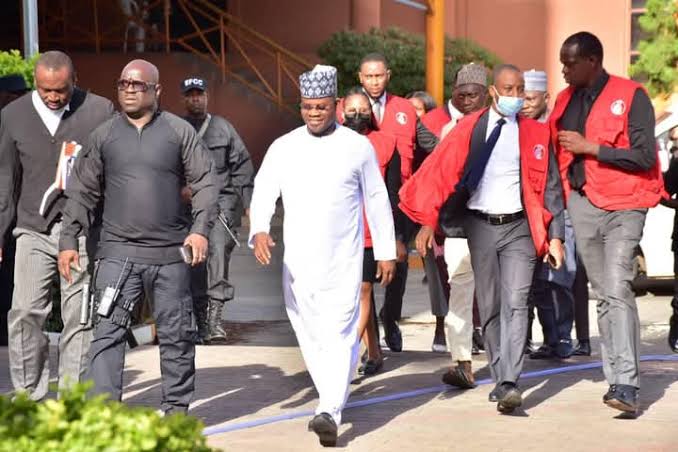News Investigators/ The Federal High Court in Abuja on Friday, fixed June 26 for ruling on an application by the EFCC to “cross examine” its 3rd prosecution witness (PW-3) in the trial of former Gov. Yahaya Bello of Kogi.
Justice Emeka Nwite adjourned the matter after listening to the submissions by the EFCC and defence lawyers on the prosecution’s move to cross-examine the witness, a position that was rejected by the defendant’s counsel, Joseph Daudu, SAN.
The request was made after Daudu, who appeared for the ex-govenor, concluded his cross examination of the PW-3, Mr Nicholas Ojehomon, an Internal Auditor with American International School, Abuja (AISA).
It would be recalled that during the cross examination by Daudu, the witness was asked specific questions regarding the judgment of the FCT High Court which was admitted in evidence as Exhibit 19.
Shortly after the cross-examination, Justice Nwite asked the counsel who appeared for the EFCC, Olukayode Enitan, SAN, if he would re-examine the witness.
Enitan, however, informed the court that he planned to also cross-examine Ojehomon based on the Exhibit 19.
He told the court that he was not re-examining the PW-3, but cross-examining him on the document admitted in evidence during cross examination by the defence.
“I am not re-examining him, I am cross-examining him because they brought this document, my lord,” he said.
Daudu, however, drew the court’s attention to the fact that the prosecution counsel’s position was unknown to law, in line with the Evidence Act.
The senior lawyer argued that under the law, if a prosecution chose to cross examine its own witness, such witness had to be declared a “hostile witness” first.
“If you want to cross-examine your own witness, you have to first declare him a hostile witness.
“You cannot cross examine him based on the document,” he argued.
Enitan, on his part, submitted that he had the right to draw the attention of the court to some specific paragraphs in the document, which the defence too had done.
“Do you have any provision of the law to support this counsel?” the judge asked.
“I will draw your lordship attention to Section 36 of the Constitution.
“They sought to tender this document, we objected and the court granted their prayer.
“Fair hearing demands that the complainant too has the right to examine this because Section 36 of the Constitution talks of fair hearing,” Enitan responded.
Daudu insisted that Enitan, under the Nigerian law, had no right to cross examine Ojehomon.
He said rather, Section 36 cited by the prosecution allowed him to re-examine the PW-2.
“We are not saying that they cannot re-examine the witness.
“That is what Section 36 under the law says about fair hearing. But if it is to cross-examine him, he will have to show us the law that backs that.
“He cannot come under the guise of fair hearing to want to cross-examine the witness,” Daudu said.
Justice Nwite then ordered the parties to address the court on the constitutional of their arguments.
In his address, Daudu maintained that the EFCC’s position was unknown to law.
“My lord, the procedure being sought by the prosecution by refering the witness to the document tendered in Exhibit 19 and by asking him to read paragraph 1, without drawing his attention to the issue on how the document affected his evidence-in -chief, the question asked in cross-examination, and the ambiguity, which needs clarification, amounts to a strange and unknown procedure not covered by the Evidence Act,” he stated.
Daudu cited two cases to back his argument, including the case of Amobi Amobi.
But Enitan disagreed, saying that in the case of Amobi Amobi referred to by the defendant’s counsel, the Supreme Court held that the learned trial judge ought to have allowed a re-examination of “Exhibit E” in the case.
He argued that the court, having allowed the defence to make use of the document in their cross examination, disallowing the prosecution to also use the document would be against the principle of fair hearing.
He said when the defence sought to introduce the document, the prosecution team opposed this because the document was not made by the witness and as such, their arguement was that Ojehomon should not be allowed to speak to it under cross examination.
“Having brought it in now, during the case of the prosecution, particularly during the cross examination of PW-3, your lordship should not allow them to shut us out as that would amount to the court allowing them to blow hot and cold,” Enitan said.
Justice Nwite thereafter adjourned to matter until June 26 for ruling.
The court also fixed June 27, July 3 and July 4 for continuation of trial.
Earlier on Friday, Ojehomon was also cross examine by Daudu.
When the lawyer asked him whether he had testified in other courts with respect to the issue of school fees paid by the Bello family to AISA, he responded in the affirmative.
The witness, however, said he could not mention the exact courts.
He admitted testifying in a similar charge involving Ali Bello but added that he never said anything adversely against former Governor Bello just as he had not said anything negative or adversely against him in the instant charge.
It would be recalled that the PW-3, on Thursday, said there was no transfer of funds from the Kogi Government or any of the local governments in the state to the account of the American International School, Abuja for the purpose of paying the school fees of the ex-governor’s children.
He also read out a part of a previous Federal Capital Territory High Court judgment that said there was no court order for AISA to return fees to EFCC or any judgment declaring the money as proceeds of money laundering.
NAN

